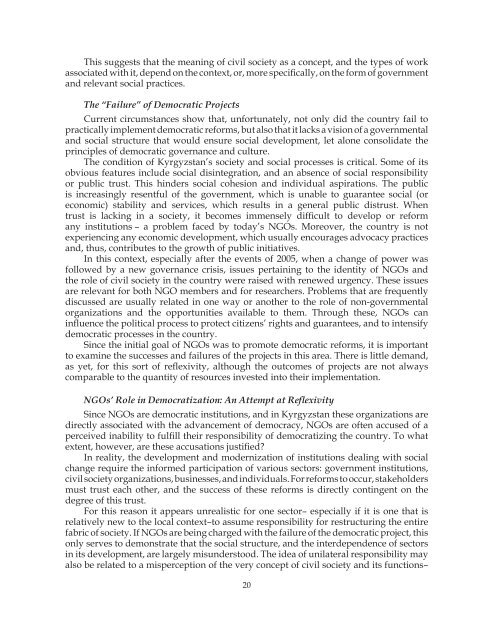KYRGYZSTAN TODAY Policy briefs on - Department of Geography
KYRGYZSTAN TODAY Policy briefs on - Department of Geography
KYRGYZSTAN TODAY Policy briefs on - Department of Geography
Create successful ePaper yourself
Turn your PDF publications into a flip-book with our unique Google optimized e-Paper software.
This suggests that the meaning <strong>of</strong> civil society as a c<strong>on</strong>cept, and the types <strong>of</strong> work<br />
associated with it, depend <strong>on</strong> the c<strong>on</strong>text, or, more specifically, <strong>on</strong> the form <strong>of</strong> government<br />
and relevant social practices.<br />
The “Failure” <strong>of</strong> Democratic Projects<br />
Current circumstances show that, unfortunately, not <strong>on</strong>ly did the country fail to<br />
practically implement democratic reforms, but also that it lacks a visi<strong>on</strong> <strong>of</strong> a governmental<br />
and social structure that would ensure social development, let al<strong>on</strong>e c<strong>on</strong>solidate the<br />
principles <strong>of</strong> democratic governance and culture.<br />
The c<strong>on</strong>diti<strong>on</strong> <strong>of</strong> Kyrgyzstan’s society and social processes is critical. Some <strong>of</strong> its<br />
obvious features include social disintegrati<strong>on</strong>, and an absence <strong>of</strong> social resp<strong>on</strong>sibility<br />
or public trust. This hinders social cohesi<strong>on</strong> and individual aspirati<strong>on</strong>s. The public<br />
is increasingly resentful <strong>of</strong> the government, which is unable to guarantee social (or<br />
ec<strong>on</strong>omic) stability and services, which results in a general public distrust. When<br />
trust is lacking in a society, it becomes immensely difficult to develop or reform<br />
any instituti<strong>on</strong>s – a problem faced by today’s NGOs. Moreover, the country is not<br />
experiencing any ec<strong>on</strong>omic development, which usually encourages advocacy practices<br />
and, thus, c<strong>on</strong>tributes to the growth <strong>of</strong> public initiatives.<br />
In this c<strong>on</strong>text, especially after the events <strong>of</strong> 2005, when a change <strong>of</strong> power was<br />
followed by a new governance crisis, issues pertaining to the identity <strong>of</strong> NGOs and<br />
the role <strong>of</strong> civil society in the country were raised with renewed urgency. These issues<br />
are relevant for both NGO members and for researchers. Problems that are frequently<br />
discussed are usually related in <strong>on</strong>e way or another to the role <strong>of</strong> n<strong>on</strong>-governmental<br />
organizati<strong>on</strong>s and the opportunities available to them. Through these, NGOs can<br />
influence the political process to protect citizens’ rights and guarantees, and to intensify<br />
democratic processes in the country.<br />
Since the initial goal <strong>of</strong> NGOs was to promote democratic reforms, it is important<br />
to examine the successes and failures <strong>of</strong> the projects in this area. There is little demand,<br />
as yet, for this sort <strong>of</strong> reflexivity, although the outcomes <strong>of</strong> projects are not always<br />
comparable to the quantity <strong>of</strong> resources invested into their implementati<strong>on</strong>.<br />
NGOs’ Role in Democratizati<strong>on</strong>: An Attempt at Reflexivity<br />
Since NGOs are democratic instituti<strong>on</strong>s, and in Kyrgyzstan these organizati<strong>on</strong>s are<br />
directly associated with the advancement <strong>of</strong> democracy, NGOs are <strong>of</strong>ten accused <strong>of</strong> a<br />
perceived inability to fulfill their resp<strong>on</strong>sibility <strong>of</strong> democratizing the country. To what<br />
extent, however, are these accusati<strong>on</strong>s justified?<br />
In reality, the development and modernizati<strong>on</strong> <strong>of</strong> instituti<strong>on</strong>s dealing with social<br />
change require the informed participati<strong>on</strong> <strong>of</strong> various sectors: government instituti<strong>on</strong>s,<br />
civil society organizati<strong>on</strong>s, businesses, and individuals. For reforms to occur, stakeholders<br />
must trust each other, and the success <strong>of</strong> these reforms is directly c<strong>on</strong>tingent <strong>on</strong> the<br />
degree <strong>of</strong> this trust.<br />
For this reas<strong>on</strong> it appears unrealistic for <strong>on</strong>e sector– especially if it is <strong>on</strong>e that is<br />
relatively new to the local c<strong>on</strong>text–to assume resp<strong>on</strong>sibility for restructuring the entire<br />
fabric <strong>of</strong> society. If NGOs are being charged with the failure <strong>of</strong> the democratic project, this<br />
<strong>on</strong>ly serves to dem<strong>on</strong>strate that the social structure, and the interdependence <strong>of</strong> sectors<br />
in its development, are largely misunderstood. The idea <strong>of</strong> unilateral resp<strong>on</strong>sibility may<br />
also be related to a mispercepti<strong>on</strong> <strong>of</strong> the very c<strong>on</strong>cept <strong>of</strong> civil society and its functi<strong>on</strong>s–<br />
20
















